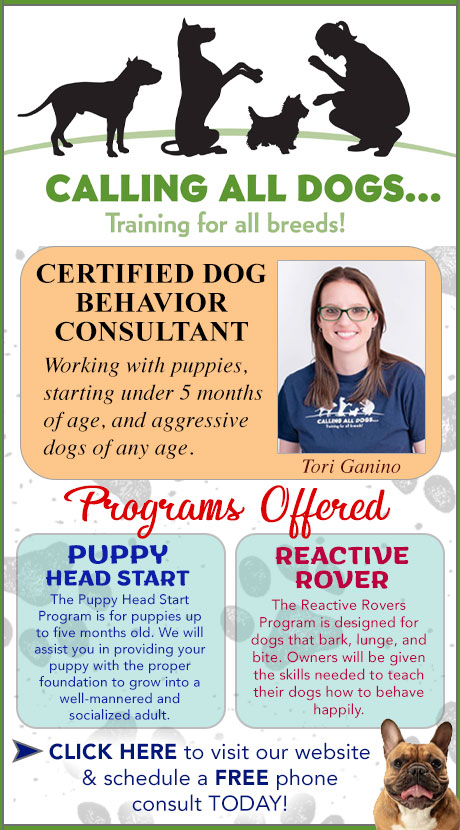Calling All Dogs
Local dog trainer completes certification to help identify underlying reasons for unexpected aggression
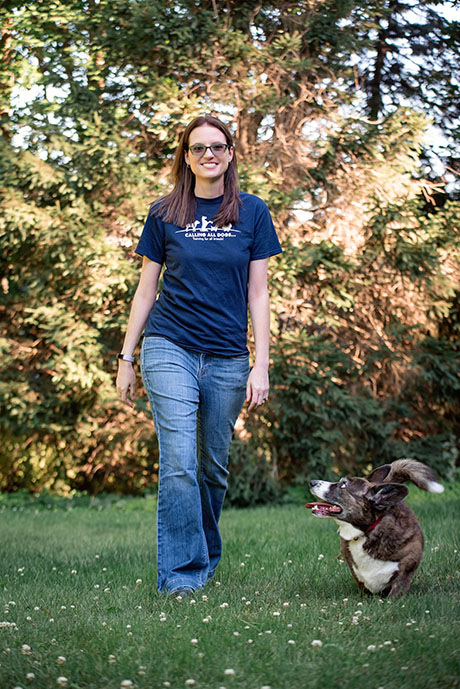
Tori Ganino isn’t afraid to admit that self-assertion is her thing.
At least when it comes to dogs. That canine characteristic of extreme self-assertion — and unwanted aggressiveness — has fueled her career and prompted the 35-year-old to continue her education.
She has recently obtained certification as a Dynamic Dog Practitioner.
“My passion is aggression. We need to know what’s going on internally,” she said during an interview Friday.“ This certification is more helping out and spotting behavior in dogs. I can see myself applying this to the dogs I work with and to my own dog. I just want to keep learning.”
Ganino is not new to embracing knowledge when it comes to working with dogs, and the canine behavior specialist eagerly added dynamic dog practitioner to her resume. Never heard of such a thing? That’s because the rigorous four-month course is only available in the United Kingdom. Other people have enrolled in the course but Ganino said that she is the only one in the U.S. to successfully complete it.
While dynamic dog practitioner may seem like an embellished title, it makes sense as Ganino explains it. Say your dog Rufus is a bit more surly than usual, and he has been barking at visitors, and — especially uncharacteristic of Rufus — nipped at one of them. You might think he is just being a bad boy, however, there very well might be underlying issues at play.
“Dogs are so extremely stoic; they hide things so very well,” Ganino said at her Elba residence.
Beneath that quiet strength might be hip pain, an achy spine or pulled muscle, she said. By thoroughly assessing the dog, she will be able to pinpoint likely sources of the pain that are causing and coming out as aggressive behavior. Contrary to popular belief that older dogs would be more prone to this occurrence, Ganino said that she has seen it in younger dogs more often. They may be working dogs that herd animals or train for agility courses, or simply playful dogs that throw their little bodies out of whack scampering on slippery floors, she said.
An online dictionary defines dynamic as “a process or system characterized by constant change, activity, or progress; relating to forces producing motion.” Just like humans often do, dogs may overcompensate an injury in one area by overusing the other, Ganino said. That can in turn create a lot of pain and/or discomfort within the dog's body, she said.
The course taught her to understand what normal movement is for the dog so that she can determine what is abnormal movement. That involves taking a history of how the dog moves, what it was like before becoming more aggressive and how it behaves now, such as biting, barking or lunging at people.
Ganino had owned and operated Calling All Dogs daycare until the dreadful Covid-19 struck. She made the difficult decision to close in March 2020, which ended up opening up a window.
“It has given me the opportunity to do this intense four-month course,” she said. “I had to present six case studies. There’s not a similar program in the world.”
The programme (spelled properly in England) teaches how to spot potential pain and discomfort in dogs “using specific, measurable and professional techniques from the ground up, whilst giving you an in-depth knowledge of the canine body,” the course website, allaboutthedogtherapy.co.uk, states.
“There are so many excellent dog training and behaviour courses out there that give you the latest up to date science based techniques to make you become an expert in your chosen field,” it states. “Despite all of them teaching you about A, B, C's they are ALL missing one vital component that is key to understanding most problem dog behaviours.”
Only 14 students are admitted at a time, and they are forewarned that the course is intensive with a blueprint for how to use the material, conduct an assessment and present the findings to the client’s veterinarian. This last piece is key to a fully implemented plan, Ganino said. She will perform a two-hour assessment of the troubled canine to evaluate its activities, movement, walking, running, standing and sitting, and the overall behavior of the dog, she said.
The finished product includes a report, video and recommended plan of action that may include prescription meds, X-rays, physical therapy and exercises. That will go to the client, behavior consultant and vet. The vet will be the one to recommend a more specific route, such as the type of medical tests or prescriptions to implement for the dog's treatment.
“There’s a lot going on when it comes to behavior and aggression; it’s not just on the outside, but a lot going on inside. Unless you’re trained, you don’t see it,” Ganino said. “We can be that team to work through these problems.”
For more information, or to find out if your dog could benefit from Ganino’s expertise, go to callingalldogsny.com, and click on Schedule a Free Consultation.
Photo by Gina Sierra, ginasierra.com
Dog trainer shutters brick and mortar location, offers services online and in homes
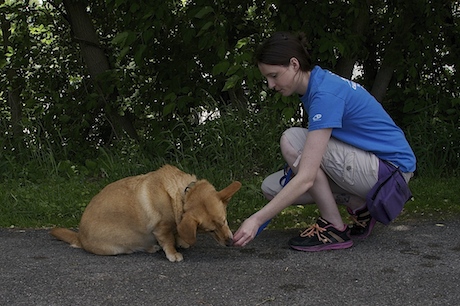
(Above, file photo from 2014 of certified local dog trainer Tori Ganino with a four-legged client.)
COVID-19 has forced Batavia-based dog trainer Tori Ganino to permanently close her facility, Calling All Dogs, at 8 Wade Ave. in the city.
As a result, she can no longer provide daycare or group classes. But she wants everyone to know that she will continue to offer private lessions in people's homes and virtually online.
Ganino has a bachelor's degree in psychology from SUNY Brockport and is a Certified Dog Behavior Specialist and has CPDT-KA certification from the International Association of Animal Behavior Consultants.
The certification process includes more than 400 hours of coursework, 500 hours of work with clients, and a 12-part essay-based exam. Certification also requires ongoing training and keeping abreast of the latest research-based behavior and training techniques. She is also an International Companion Animal Network Member.
If you are have a new puppy or want some guidance about your dog's behavior, you can schedule a free 30-minute phone consulation by phoning (585) 455-5387 or emailing her: callingalldogsny@gmail.com
Ganino specializes in helping frustrated owners whose dogs bark, lunge and cower to gain control over the chaos. Using science-based force-free training, she helps owners transform their exuberant dogs into well-mannered companions.
Her featured programs include:
- Reactive Dog Program -- Designed for dogs that bark, lunge, and bite. Owners learn skills needed to teach their dog how to behave happily.
- Well-mannered Companion Program -- Learn how to transform your exuberant dog into a calmer and more suitable companion.
Her website also has helpful, informative posts such as: "Using Games to Calm Your Dog," "How to Break Up a Dog Fight," and in a world of punishment-based training and quick TV fixes, she offers this benevolent insight "I'm My Dogs' Caregiver, Not Their Alpha."
Clients praise her calm demeanor, skillfulness and professionalism in doing a job she clearly enjoys. They say she listens carefully, communicates effectively, follows through on details, and works tirelessly to craft a plan to achieve the best outcomes for dogs and their owners.
Previously:
LIVE: Interview with Tori Ganino, dog trainer
Interview with Tori Ganino, dog trainer, owner of Calling All Dogs in Batavia.
'Calling All Dogs' owner accepted into international organization for dog behaviorists
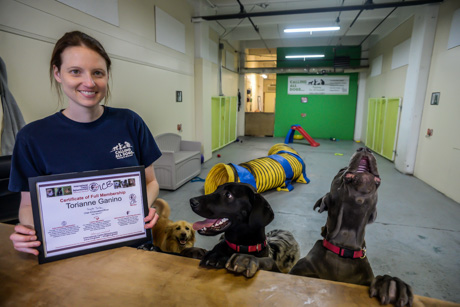
Tori Ganino, owner of Calling All Dogs, in the Harvester Center, has been accepted for membership in the International Canine Behaviorists.
The England-based organization provides ongoing professional development for dog behaviorists and enforces a code of ethics and code of conduct and requires certification for membership.
Ganino said she believes she's the first member in the United States.
Local dog behaviorist offers discounts for owners who turn in punishment collars
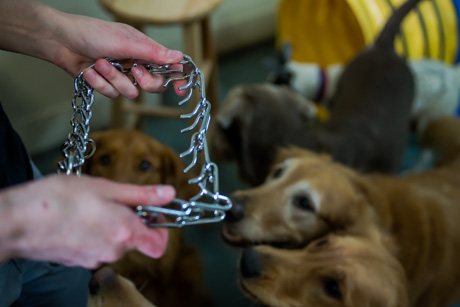
Because choke, pinch and prong dog collars really don't help improve a dog's behavior, and can actually make bad behavior worse, Tori Ganino, owner of Calling All Dogs, 56 Harvester Ave., Batavia, is offering a discount on training to owners who leave those collars with her so they can be destroyed.
Leave one of those types of collars and get $12 off a group class or $12 off an in-home training visit, or leave an electric collar and get $15 off.
"These collars create all kinds of negative associations and don't help build a relationship with your dog," Ganino said. "They create bad associations, so if a person is walking by and a dog is already a little bit nervous and then they see the person and they get pinched or they get choked, that just validated the feelings that the person is bad because they got hurt when they saw the person. It can make behaviors worse."
If a dog learns that pain will be associated with pre-bite warnings, such as barking or lunging, the dogs will learn to suppress those warnings and instead just bite, Ganino said, which makes them very hard to work with later when tryng to unlearn that behavior.
And even in a good-natured dog, the pain hurts the dog's relationship with its owner, she said, because they see the owner as the one inflicting the pain.
Ganino wants owner to bring punishment collars in and learn the kind of behavioral techniques, build around rewards and learning alternative behaviors, for the sake of the dogs, the owners and anyone they might encounter.
"I want to be able to show people is that they can change their dog's emotional response so things are not nearly so scary," Ganino said.
The phone number for Calling All Dogs is (585) 455-5387.
NOTE: Rocky update: Tori helped us a lot with Rocky and we continue to work with him. His behavior has improved; he's lost a lot of his fear and demonstrates a lot more happy and loving behavior.
Dog trainer becomes first certified animal behavior consultant in Genesee County
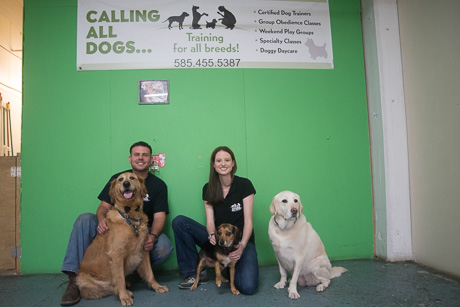
We think of dogs who bite, lunge, snarl and bark as aggressive, but that isn't necessarily the case, according to Tori Ganino, co-owner of Calling All Dogs, on Harvester Avenue.
Those behaviors are often a response born of fear, Ganino said, and dogs can be taught to be less fearful in situations they find stressful.
"What we do is train them that these situations aren't so bad, that you don't have to be afraid, you don't have to bite to make the person or thing go away," Ganino said. "Instead, we're going to help you feel better about it. So we change their emotional responses from a fearful one to a good one so that when I they see this person coming along, it's not such a bad thing. It's a good thing."
Ganino is a certified animal behavioralist, certified by the International Association of Animal Behavior Consultants, the only such certified consultant in Genesee County.
The certification process includes more than 400 hours of coursework, 500 hours of work with clients and a 12-part, essay-based exam. Certification also requires ongoing training and keeping abreast of the latest research-based behavior and training techniques.
Ganino started on the path toward certification after becoming the owner of a dog who had become fearful after a bad experience with a man in a pet store where the dog had been available for adoption. Ganino said in certain situations, the dog would just shake with fear. She wanted to help her pup handle fearful situations better so she sought some training.
The first training class used what's known as "flooding," which is repeated exposure to the fearful situation until the dog learns not to fear the stimulus any longer, usually by just emotionally shutting down. Ganino didn't feel good about that technique for her dog, so she sought out alternatives and discovered animal behavior training.
"I wanted to find a way to help him feel better about the situation and not put him in a situation he couldn't handle," Ganino said.
Unlike techniques that rely on punishment or dominance, behavioral training is about positive reinforcement for correct behavior.
If a dog snarls and lunges at certain people, the owner shouldn't scold, but rather divert the dog's attention, elicit the desired response and then reward the dog for the correct behavior.
"If he's in a situation where he's growling, he's over the point where he's comfortable with what's going on, so you need to take him away from it so can get him at a place where he's comfortable and then start the training," Ganino said. "That's where the behavior work really starts. You can't reinforce the emotion. You can make changes to get him to feel better, but at the time that he's seeing that person and thinking, 'I'm upset and I'm getting yelled at, too,' he learns that it validates his concerns. He's feeling a threat. It's not a good situation and he's getting yelled at."
Dogs look to their owners for leadership and an owner who is upset in a bad situation is telling a dog "This is a situation where you should be upset."
"With behavior work, we don't say, 'I don't want you to bark at this person,' " Ganino said. "Instead, we say, 'Why don't you look at me. Why don't we go over here and do this.' because 'no' just means stop, but you're not helping him understand what he's supposed to do. When he's lunging at another person, back him up and work with him so he realizes, 'I can look at that person, but what am I supposed to do when I look at him? I'll look back at mom and dad and they'll guide me through it. We'll play. We'll get rewards for it and then we'll go on our way.' "
Ganino owns Calling All Dogs with her husband, Rich, and while Ganino specializes in working with fearful and aggressive dogs, Calling All Dogs offers a range of obedience classes and personal training sessions as well as doggie day care.
A typical six-week class is $99, but on a space-available basis, owners of foster dogs can sign up for free classes.
Well-behaved dogs are socialized, get plenty of exercise and ample mental stimulation. They know what's expected of them and can count on their owners to provide a stable routine. Obedience classes are as much about training the owners as training the dogs, and it helps the owners understand how to avoid situations that maybe their dogs can't handle and then raising the fear factor.
"Any dog can have that emotional change to 'I'm upset and I'm scared,' " Ganino said. "A lot of times biting is a response to 'I'm afraid.' We can help a dog feel better, but it's up to the owners not to put them in situations they're not ready to handle."

